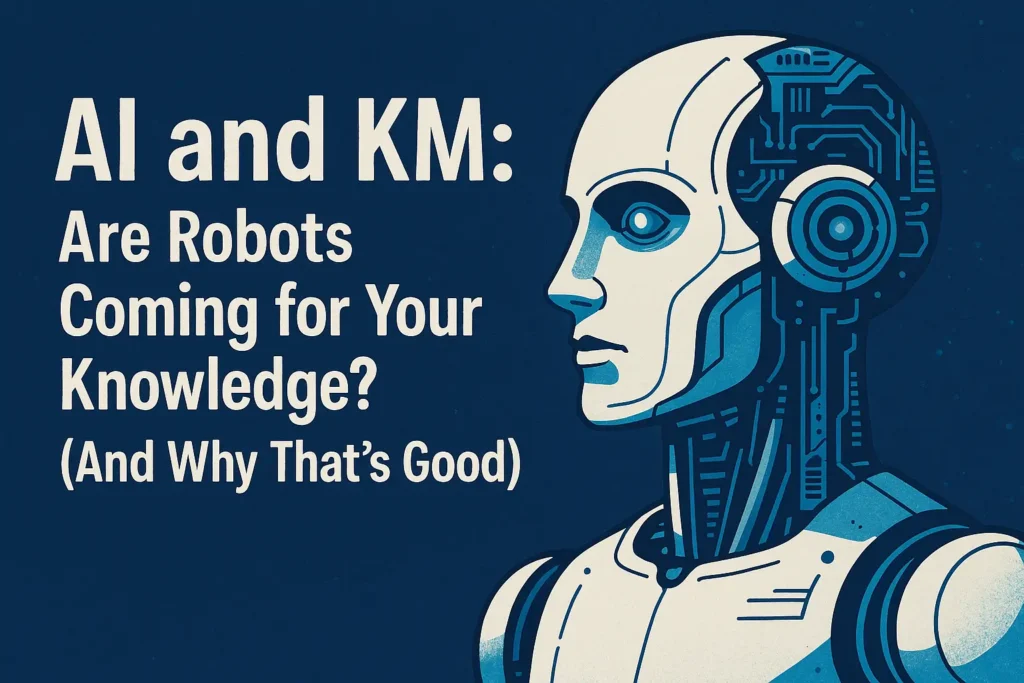The whispers have turned into roars. Artificial Intelligence is no longer just a futuristic concept; it’s here, it’s learning, and it’s rapidly transforming how we interact with information. For those of us steeped in Knowledge Management (KM), a natural question arises: Is AI poised to automate us out of existence, or is it the ultimate partner we’ve been waiting for?
Let’s clear the air: No, robots aren’t “coming for your knowledge” in the sense of replacing human intellect and expertise. Instead, AI is ushering in an exciting new era for KM, one where the mundane gives way to the meaningful, and human potential is amplified, not diminished.

The KM Challenge: A Mountain of Untapped Gold
For decades, Knowledge Management has grappled with persistent challenges:
- Information Overload: We’re drowning in data, documents, emails, and conversations. Finding the right piece of information at the right time is like searching for a needle in a digital haystack.
- Knowledge Silos: Expertise often remains trapped within departments or even individual minds, preventing a holistic organizational understanding.
- Tacit Knowledge Loss: The invaluable “know-how” that isn’t written down often walks out the door when an experienced employee retires or moves on.
- Outdated Information: Maintaining the relevance and accuracy of a vast knowledge base is a never-ending, often tedious, task.
- Poor Discoverability: Even if the knowledge exists, if people can’t find it easily, it’s as good as lost.
These aren’t minor inconveniences; they’re significant bottlenecks to innovation, efficiency, and growth. And this is precisely where AI steps in, not as a threat, but as a powerful ally.
How AI is Revolutionizing Knowledge Management: Your New KM Superpowers
Imagine a KM system that doesn’t just store information, but truly understands it. That’s the promise of AI in KM, delivering a suite of “superpowers” that augment, rather than replace, human capabilities.
- Intelligent Search & Discovery: Beyond Keywords
Traditional search relies on keywords. AI-powered search, particularly with Natural Language Processing (NLP) and semantic search, understands intent. You can ask questions in plain language, and the system can infer meaning, connect concepts, and retrieve relevant information even if the exact words aren’t present. This transforms a frustrating search into a rapid discovery. - Automated Content Curation & Organization: Taming the Chaos
Tagging, categorizing, summarizing, and linking documents used to be a monumental, manual effort. AI can now automate much of this:- Automatic Tagging and Classification: AI algorithms can analyze content and automatically apply relevant tags and categories, ensuring consistency and discoverability.
- Content Summarization: Generative AI can condense lengthy reports, meeting transcripts, or articles into concise summaries, saving valuable reading time.
- Identifying Gaps and Redundancy: AI can analyze your knowledge base to highlight missing information or identify duplicate content, helping you maintain a clean and comprehensive repository.
- Expert Insight: This frees KM professionals from tedious data entry and organization, allowing them to focus on higher-value activities like strategy, content quality, and fostering a knowledge-sharing culture.
- Personalized Knowledge Delivery: The Right Info, Right Time
No two employees need the exact same information at the exact same moment. AI can personalize the knowledge experience:- Proactive Recommendations: Based on a user’s role, projects, search history, and even calendar, AI can proactively suggest relevant articles, experts, or training modules.
- Contextual Assistance: Imagine an AI “copilot” integrated into your workflow, offering immediate, context-specific answers without you having to leave the application you’re working in.
- Expert Insight: This elevates knowledge from a static repository to a dynamic, responsive partner, pushing relevant insights to users before they even know they need them.
- Extracting Insights from Unstructured Data: Finding the Hidden Gems
A vast amount of valuable organizational knowledge resides in unstructured formats: emails, chat logs, call transcripts, meeting recordings, and social media. AI’s NLP capabilities can parse this data, extract key entities, sentiments, and patterns, turning a messy data lake into an actionable goldmine.- Expert Insight: This is crucial for capturing tacit knowledge that was previously lost. AI can “listen” to conversations and identify expertise, recurring questions, or emerging trends that inform future knowledge creation.
- Expert Insight: This is crucial for capturing tacit knowledge that was previously lost. AI can “listen” to conversations and identify expertise, recurring questions, or emerging trends that inform future knowledge creation.
- Accelerating Content Creation: From Blank Page to Draft
Generative AI tools can now assist in drafting knowledge articles, FAQs, training materials, and more. While human oversight remains critical, AI can provide initial outlines, research summaries, and even full drafts, drastically reducing the time it takes to produce new content.- Expert Insight: This empowers subject matter experts to share their knowledge more easily, lowering the barrier to contribution and ensuring that valuable insights are captured while they’re fresh.
The Future is Collaborative: Human + AI
The true power of AI in KM isn’t about replacing humans; it’s about creating a synergistic partnership.
- Humans provide the wisdom, context, and judgment: AI excels at pattern recognition, processing vast data, and automating tasks. But human intelligence provides the critical thinking, creativity, empathy, and understanding of nuance that AI cannot replicate.
- AI handles the heavy lifting, humans focus on strategy: By offloading repetitive and data-intensive tasks to AI, KM professionals can dedicate their energy to more strategic initiatives: identifying critical knowledge gaps, fostering a culture of learning, and ensuring the ethical use of AI within their systems.
- Enhanced Decision-Making: With AI providing faster, more comprehensive access to relevant, synthesized information, human decision-makers can operate with greater confidence and accuracy.
Of course, the journey isn’t without its considerations. Data quality, ethical AI usage, explainability of AI’s outputs, and the need for continuous human oversight are paramount. But these are challenges to be managed, not reasons to shy away from this transformative technology.
So, are robots coming for your knowledge? In a way, yes – they’re coming to organize it, enrich it, make it more accessible, and unlock its true potential. And for anyone dedicated to the power of knowledge, that’s incredibly good news. Embrace the partnership; the future of knowledge is intelligent, collaborative, and more human than ever before.
